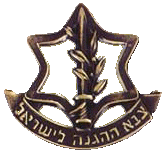|
שבת שלום - פרשת אחרי מות - קדושים
|
|
Video Shiur
|
Click play to watch the video shiur by Rav Yosef Kaminetsky
|
|
News and Notes
|

On Sunday, the yeshiva
had its annual pre-Yom
HaZikaron tiyul to battle
sites around Jerusalem,
and to the military cemetery
on Har Herzl. It was
a fitting prelude to
the evening, when we
joined Moshav Zanoach
in its annual Yom HaZikaron
memorial service for
fallen IDF soldiers.
Hearing the siren at
8 PM in the company of
Israelis who had experienced
the triumphs and tragedies
of Israel's wars was
a moving and memorable
experience.
On
Yom HaAtzmaut, we were
honored to host Joe Hyams,
the CEO of www.HonestReporting.com,
who discussed media bias
against Israel, and what
all of us can do to combat
anti-Israel propaganda
wherever it appears.
Rav Wolicki then gave
a shiur about Yom HaAtzmaut
based on the thought
of Rav Shaul Yisraeli,
in which he explained
the religious importance
of this particular date.
The students then watched
the film, "The Long Way
Home", which described
the years between the
Holocaust and the founding
of the State of Israel.
In the afternoon, the
yeshiva hosted its sixth
annual Yom HaAtzmaut
barbecue for students,
faculty, and their families.
On
Thursday night, Rav Kahn's
sicha dealt with "Eight
Torah Approaches to Medinat
Yisrael". Rav Kahn's
mishmar shiur dealt with
the meaning of the term
"HaMakom" when used to
describe Hashem, Rav
Wolicki offered three
approaches to explain
the various maamarei
Chazal on the deaths
of Aharon's sons, and
Rav Arram gave a Breslov-based
interpretation of important
ideas in Pirkei Avot.
|

Respect for Elders as a Tenet of our Faith
By Rabbi Pesach Wolicki
In the presence of the elderly you shall rise and you shall respect an elder; you shall fear your G-d, I am Hashem. (Vayikra 19:32)
This mitzvah - respect for the elderly - is easily understandable.
What is unusual is the context in which it appears in the Torah. This verse is the last of a ten pasuk parsha - a section from space to space in the Torah - that deals almost exclusively with forbidden pagan practices. Even the agricultural rules of orlah stated at the beginning are understood by some to have their root in the negation of certain pagan beliefs and customs. (see Ramban here, and Maimonides Guide III:37)
What possible connection is there between honoring the elderly and the importance of avoiding the immorality of pagan beliefs and ways? Why specifically is this commandment linked to the general injunction to fear Hashem?
In the preface to his classic work on paganism, The Golden Bough, Sir James Frazer writes that the fear of death and of the dead is "on the whole, probably the most powerful force in the making of primitive religion."
Paganism is obsessed with death because pagans were entirely focused on the natural world. They feared death so strongly because they believed that they - like everything else in the natural world - was finite and mortal.
Everything in the natural physical world follows the same trajectory of life and growth. A thing is born or comes to life. In the first third to quarter of its lifespan it grows to its peak of size and strength. It then begins a gradual decline in strength and vitality until finally dying.
This is the way of all living things; plants, animals, and human bodies.
The exception to this rule is the human soul. A human being does not peak emotionally, intellectually, and spiritually at the same time as the body reaches its peak of health and strength. The soul of man continues to develop and grow long after the body has begun its decline towards death. In fact, the soul, if left unimpeded by the chemical interference of the deterioration of the body, continues to grow stronger throughout life. The body, on the other hand, no matter how good the conditioning program, inevitably deteriorates if only gradually.
Seen this way, the soul is - in effect - immune from the rules of physicality. It does not follow the rules of the natural system.
In an ideology that views the physical as the primary mode of existence - in a society that values the body as the main focus of the human experience - one whose body is at its peak of strength and beauty will be revered. If, on the other hand, the spiritual is valued as primary, honor will be given to those whose souls are more fully developed. By commanding us to honor the elderly the Torah is teaching us that the essence of the human being is spiritual.
The Torah uses an unusual verb in the commandment to respect the elderly. The Hebrew words are "vehadarta pnei zaken". "Vehadarta" does not really mean respect. In fact, the word is a verb form of the word "hadar" meaning "beauty". The exact translation of the commandment is probably closer to "you shall find beauty in the face of an elder".
How fitting.
The natural inclination is to be impressed by youthful beauty. It is very physically appealing. The Torah is telling us that this mistaken view sees only the natural physical side of things. The essence of humanity is the soul. It is above the natural system. We are to look beyond the natural and physical. We are supposed to see the true human beauty. If we see things correctly, the result will be "vehadarta pnei zaken."
The verse ends with the injunction to fear G-d. The connection is clear. When we say that man was created in the image of G-d we mean the soul, not the body. Proper respect for the elderly constitutes rejection of a physically centered existence and acceptance of a spiritual reality.
May we all build stronger connections to the elderly in our lives, our greatest sources of wisdom and spiritual guidance.
|